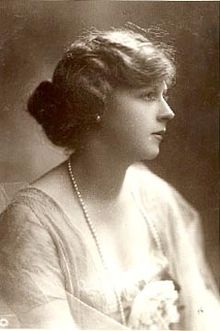Marie Lohr
Marie Lohr | |
|---|---|
 | |
| Born | 28 July 1890 |
| Died | 21 January 1975 (aged 84) |
| Other names | Marie Löhr |
| Occupation | Actress |
| Years active | 1894–1968 |
| Spouse | Anthony Prinsep |
| Parents |
|
Marie Lohr (28 July 1890 – 21 January 1975) was an Australian film and stage actress.
Biography
Marie Löhr was born in Sydney, New South Wales, to Lewis J. Löhr, treasurer of the Melbourne opera house, and his wife, the English actress Kate Bishop (1848–1923). Her maternal uncle, Alfred Bishop, along with her godparents, William and Madge Kendal, were also actors.[1]
Career
Her first stage appearance was in Sydney, aged 4, in The World Against Her. Her London debut (after the family's move to Britain), was at age 11, in Shockheaded Peter as well as The Man Who Stole the Castle. (Shockheaded Peter also starred Kate Bishop and George Grossmith Jr., and was produced at the Garrick Theatre in 1900.)[2] Her later stage-work included appearances in a 1929 London stage production of Beau Geste alongside Laurence Olivier, and in the original production of the 1930 play The Bread-Winner.
Her first film appearance was in the 1932 film version of Aren't we All?, and — having appeared in several of George Bernard Shaw's works onstage — her subsequent films included two Shaw adaptations. She died at the age of 84, and was buried in the Brompton Cemetery in west London.
Filmography
- Great Catherine (1968), Dowager Lady Gorse
- The Plane Makers (1964), Geraldine Pettifur - one episode
- Carlton-Browne of the F.O. (1959), Lady Carlton-Browne
- The Last Chronicle of Barset (1959), Lady Lufton - two episodes
- Small Hotel (1957), Mrs. Samson-Fox
- Seven Waves Away (1957), Dorothy Knudson
- A Town Like Alice (1956), Mrs. Dudley Frost
- On Such a Night (1956), Lady Falconbridge
- Out of the Clouds (1955), Rich Woman
- Escapade (1955), Stella Hampden, Senior
- Always a Bride (1953), Dowager
- Little Big Shot (1952), Mrs. Maddox
- Silent Dust (1949), Lady Clandon
- The Winslow Boy (1948), Grace Winslow
- Anna Karenina (1948), Princess Scherbatsky
- Counterblast (1948), Mrs. Cole
- The Ghosts of Berkeley Square (1947), Lottie
- The Magic Bow (1946), Countess de Vermond
- The Rake's Progress (1945), Lady Parks
- Twilight Hour (1945), Lady Chetwood

- Kiss the Bride Goodbye (1945), Emma Blood
- Went the Day Well? (1942), Mrs. Fraser
- Major Barbara (1941), Lady Britomart
- George and Margaret (1940), Alice
- A Gentleman's Gentleman (1939), Mrs. Handside-Lane
- Pygmalion (1938), Mrs. Higgins
- South Riding (1938), Mrs. Beddows
- Dreams Come True (1936), Helen von Waldenau
- Whom the Gods Love: The Original Story of Mozart and His Wife (1936), the Empress
- It's You I Want (1936), Constance Gilbert
- Reasonable Doubt (1936), uncredited
- Cock o' the North (1935), Mary Barton
- Royal Cavalcade (1935), Mother
- Foreign Affaires (1935), Mrs. Cope
- Lady in Danger (1935), Lady Brockley
- Oh, Daddy! (1935), Lady Pye
- My Heart is Calling (1935), Manageress of Dress Salon
- Fighting Stock (1935), Mrs. Barbara Rivers
- Mon Coeur t'Appelle (1934), Modiste - English version: My Heart is Calling You
- Road House (1934), Lady Hamble
- Aren't We All? (1932), Lady Frinton
- Victory and Peace (1918), Barbara Rowntree
- The Real Thing at Last (1916), Murdered Woman
External links
- Marie Lohr at IMDb
- "Lohr, Marie". Oxford Dictionary of National Biography (online ed.). Oxford University Press. doi:10.1093/ref:odnb/40471. (Subscription or UK public library membership required.)
- findagrave.com
References
- ^ Higgins, Sydney. "Marie Löhr (1890-1975)". THE GOLDEN AGE OF BRITISH THEATRE (1880-1920).
- ^ The Times, 27 December 1900, p. 8
- Use dmy dates from August 2010
- Australian emigrants to England
- Australian film actresses
- Australian silent film actresses
- Australian stage actresses
- Australian child actresses
- People from Sydney
- 1890 births
- 1975 deaths
- Burials at Brompton Cemetery
- English film actresses
- English stage actresses
- English child actresses
- 20th-century English actresses
